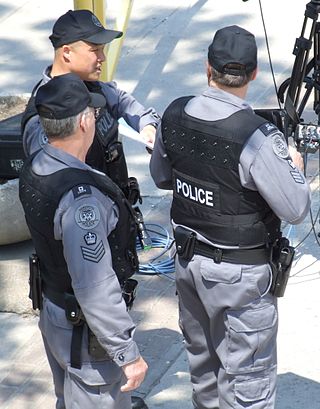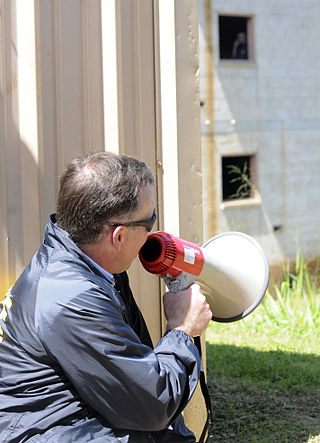
The Hostage Rescue Team (HRT) is the Federal Bureau of Investigation's (FBI) elite tactical unit. The HRT was formed to provide a full-time federal law enforcement tactical capability to respond to major terrorist incidents throughout the United States. Today, the HRT performs a number of tactical law enforcement and national security functions in high-risk environments and conditions and has deployed overseas, including with military Joint Special Operations Command (JSOC) units. In an article to mark its 40th anniversary, it was reported that since its formation in 1983 the HRT had deployed more than 900 times.
The Critical Incident Response Group (CIRG) is a division of the Criminal, Cyber, Response, and Services Branch of the United States Federal Bureau of Investigation. CIRG enables the FBI to rapidly respond to, and effectively manage, special crisis incidents in the United States.
The Behavioral Analysis Unit (BAU) is a department of the Federal Bureau of Investigation's National Center for the Analysis of Violent Crime that uses behavioral analysts to assist in criminal investigations. Their mission is to provide behavioral-based investigative and/or operational support by applying case experience, research, and training to complex and time-sensitive crimes, typically involving acts or threats of violence.

The Emergency Task Force (ETF) is the police tactical unit of the Toronto Police Service. Created in 1965, it is mandated to deal with high-risk situations like hostage-taking, emotionally disturbed persons, high-risk arrests, warrant service, protection details, and crowd control. The Emergency Task Force is also responsible for responding to any terrorist incidents that occur throughout the City of Toronto.

A prison officer (PO) or corrections officer (CO), also known as a correctional law enforcement officer or less formally as a prison guard, is a uniformed law enforcement official responsible for the custody, supervision, safety, and regulation of prisoners. They are responsible for the security of the facility and its property as well as other law enforcement functions. Most prison officers or corrections officers are employed by the government of the jurisdiction in which they operate, although some are employed by private companies that provide prison services to the government.

The Special Task Force (STF) is the elite Tier 1 police tactical unit of the South African Police Service (SAPS). The Special Task Force handles high risk operations that fall beyond the scope of classic policing which require specialised skills.
The State Protection Group (SPG) is part of the Counter Terrorism & Special Tactics Command of the New South Wales Police Force and was established in 1991 to deal with extraordinary policing responses. The SPG directly supports police in high-risk incidents such as sieges with specialised tactical, negotiation, intelligence and command-support services. The unit also provides rescue and bomb disposal support, canine policing, and armoury services.
The Security Operations Group (SOG) is a unit of elite corrections officers of Corrective Services NSW, Australia formerly known as the Hostage Response Group (HRG).

An active shooter is the perpetrator of an ongoing mass shooting. The term is primarily used to characterize shooters who are targeting victims indiscriminately and at a large scale, who oftentimes, will either commit suicide or intend to be killed by police. More generally, an active perpetrator of a mass murder may be referred to as an active killer.

The Emergency Response Unit (ERU) is the police tactical unit of the Garda Síochána, Ireland's national police and security service. The unit was a section of the forces' Special Detective Unit (SDU), under the Crime and Security Branch (CSB) until 2017, when the Special Tactics and Operational Command was created to take over its operational duties alongside Armed Support Units.

The Felony Investigative Assistance Team (FIAT) is a multi-jurisdictional police task force comprising 16 law enforcement agencies in Cook County, Illinois, and DuPage County, Illinois. The taskforce covers approximately 300,000 residents in those jurisdictions. It is broken down into five units, four of which are staffed by assigned officers.

The Maine State Police (MSP) is the state police agency for Maine, which has jurisdiction across the state and was created in 1921.
Police tactical group (PTG) is the generic term used to refer to highly trained Australian and New Zealand police tactical units that tactically manage and resolve high-risk incidents, including sieges, armed-offender situations and terrorist incidents.

The Pigeon Forge Police Department, sometimes referred to as "PFPD", is the primary law enforcement organization serving Pigeon Forge, Tennessee in the United States.
Special Operations Response Teams are a group under the US Federal Bureau of Prisons (BOP), a component of the US Department of Justice. The BOP is responsible for maintaining the custody of anyone convicted of committing a federal crime. To achieve this goal, the BOP maintains a number of correctional facilities, which are divided into six regions, throughout the US. These facilities house approximately 211,195 inmates of varying security levels. Facilities are designated as either minimum, medium, maximum, or the most recent addition, super max.

The Behavioral Science Unit (BSU) is the original name of a unit within the Federal Bureau of Investigation's (FBI) Training Division at Quantico, Virginia, formed in response to the rise of sexual assault and homicide in the 1970s. The unit was usurped by the Critical Incident Response Group (CIRG) and renamed the Behavioral Research and Instruction Unit (BRIU) and currently is called the Behavioral Analysis Unit (5) (BAU-5) within the National Center for Analysis of Violent Crime (NCAVC). The BAU-5 currently works on developing research and then using the evidence-based results to provide training and improve consultation in the behavioral sciences—understanding who criminals are, how they think, why they do what they do—for the FBI and law enforcement communities.
FBI Special Weapons and TacticsTeams are specialized part-time SWAT teams of the Federal Bureau of Investigation (FBI). The FBI maintains SWAT teams at each of its 56 field offices throughout the United States. Each team is composed of a varying number of certified SWAT operators, dependent on office size and funding.

Crisis negotiation is a law enforcement technique used to communicate with people who are threatening violence, including barricaded subjects, stalkers, criminals attempting to escape or evade arrest, and hostage-takers. Crisis negotiation is often initiated by the first officer(s) on the scene.

Christopher "Chris" Voss is an American businessman, author, and academic. Voss is a former FBI hostage negotiator, the CEO of The Black Swan Group Ltd, a company registered in East Grinstead, England, and co-author of the book Never Split the Difference. He is an adjunct Professor at Harvard Law School, Georgetown University's McDonough School of Business, and a lecturer at the Marshall School of Business at University of Southern California.












